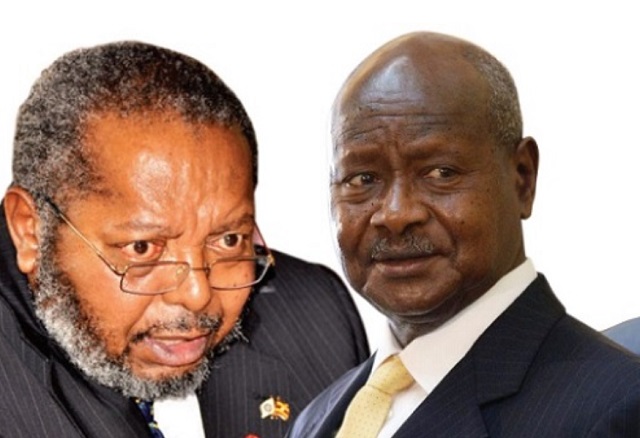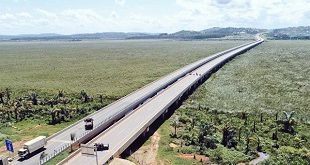
Why their opposing views still represent the ideological contention over Uganda’s destiny
THE LAST WORD | ANDREW M. MWENDA | The memorial service of deceased central bank governor, Emmanuel Tumusiime-Mutebile, provided a rare glimpse into the ideological contests that shaped the nature of the economy of present-day Uganda. President Museveni said he had been misled by Mutebile to privatize Uganda Commercial Bank (UCB). Instead, he said, he should have listened to Ezra Suruma, then the bank’s Managing Director, who had argued passionately that the bank remains in the hands of the state of Uganda.
The two sides were in ideological contention over the destiny of Uganda. On one side were the free marketeers and on the other, the statists. Mutebile led the free market forces, Suruma the statists. At a personal level, the two men were friends and hailed from Kigezi. The two sides can be seen in another light – the globalists (Mutebile’s side) and the nationalists (Suruma’s). I write this article with a lot of humility because I was, at the time, a strong believer in the free market and stood shoulder to shoulder with Mutebile.
The Mutebile side argued for efficient allocation of resources, the Suruma side for national control and direction of economic resources. For the Mutebile side, it did not matter who owned the commanding heights of the economy – locals or foreigners. The critical issue was the quality of services and goods a business produced and the cost of these to the consumer. The Suruma side argued that development required the state or local capital to own and direct economic resources to sectors critical for national transformation.
Museveni was ideologically won over by the Mutebile side. The President has, at heart, remained a Mutebilist. He still believes in Foreign Direct Investment (FDI) as the vehicle for national transformation even though there is no country in the world that has been transformed by it. Whether it is USA, UK, Japan, South Korea or today’s China, all of them have been transformed by national champions owned by their own citizens or by the state. On the contrary the nations of Latin America and Africa have failed to transform in large part because of the early dominance of multinational capital in their economies.
I was a radio talk show host at the time and even invited Mutebile and Suruma to a thrilling debate on the sale of UCB. To give the free-market side greater voice, I would invite intellectuals like my own mentor and friend, Charles Onyango-Obbo, Keith Muhakanizi, Simon Rutega etc. to the show. I was so dismissive of the statist arguments, I even felt and argued that they were self-serving. Those in control of state enterprises did not want to relinquish their power and influence. Therefore, they had a vested interest in perpetuating corruption and patronage.
I was, in those days, so angry at the way powerful individuals had used their influence to get loans from UCB without following procedures. This corruption of the state and influence peddling led me to believe that privatisation was the best way to liberate the economy from state patronage. I was even convinced that the best way to limit corruption and patronage was to sell public enterprises to multi national firms. Liberated from local political wheeler dealing, these firms would build an economy based on merit.
Today I write as a reformed free marketeer, my views moderated by practical experience and a reading of the economic history of nations that have undergone structural transformation-development. From the USA and Germany (that had to industrialise after the United Kingdom) to the Nordic countries and then to Japan, South Korea and now China, one factor remains – development requires a high degree of national control and direction of resources to areas the state, not the market, has identified as top priority.
Looking back at those debates, I can now see where we went wrong. True, free markets can give you allocative efficiency but they do not address the problem of structural transformation that lies at the heart of development. Museveni is waking up to this reality when it is too late to turn the hands of the clock. More than 90% of the banking sector in Uganda today is in the hands of multinational capital. This makes it impossible for government to direct credit to priority areas which can stimulate transformation.
This reality was most manifest in 2016 when the central bank of Uganda (which would be better called the central bank of multinational capital in Uganda) closed Crane Bank. At the time, Crane Bank had 800,000 accounts, Centenary Bank 1.3 million. But the largest bank in Uganda, Stanbic Bank, which had bought UCB, had only 300,000. The second largest bank, Standard Chartered Bank, had about 200,000. Clearly the largest banks in Uganda had little interest in serving the citizens of this republic, most of whom remained (and still remain) unbanked.
These big multinational banks are not interested in mobilising local resources. They have huge portfolio deposits from fellow multinational corporations that dominate Uganda’s economy, and from international development agencies, NGOs and embassies. Why therefore would they seek the patronage of poor Ugandans? These banks make money by trading in government paper, they only lend to a few local businesses out of a desire to diversify their risk rather than out of a vested interest in growing this as a core market.
No country’s economy feeds foreign interests at the expense of its own citizens as Uganda. This has only been possible because of our ideological mindset. Ugandans harbor strong petty jealousies. It makes us angry to see a fellow Ugandan prosper. When a prosperous Ugandan makes a mistake, we use this as an excuse to call for their destruction – because here the culprit has a face. But when an institution like Stanbic or MTN commits a gross wrong, there is no individual owner who is also local against whom we can direct our anger. It passes with little or no notice.
The final straw is the legitimacy of the state. We are a very poor country but we demand that the state provides us a large basket of public goods and services – health, water, education, electricity, security, justice, etc. for free. This pressure leads to persistent fiscal deficits which are financed through domestic and external borrowing. Then comes in URA. For many years, it only allowed multinational banks to hold its accounts. So, most taxpayers would pay through Stanbic or Stanchat. These banks would then use this money to buy treasury bonds at 15%. Essentially, they were using government money to buy government paper, make windfall profits and ship it abroad. Yet this is never the debate we have in our politics.
****
amwenda@independent.co.ug
 The Independent Uganda: You get the Truth we Pay the Price
The Independent Uganda: You get the Truth we Pay the Price




Its not never too late andrew. What we actually lost, and which may never be recovered are the physical assets of UCB. I stronlgly believe the bank can be restored with the stroke of a pen, literally. My worry is that we lack the political will to do exaxtly that. Our political leaders talk too, way too much and do well little.
Rhetorists, rationalists, and ideologues like Andrew Mwenda think knowledge comes from reasoning. But scientists who actually make a difference in the real world believe it comes from experience. The only way to prove something is through empirical evidence. It is good that Andrew Mwenda has seen this for himself. We should throw out overly clever idealogies and simply copy what works from the successful nations. They have already done the research for us.
What is working for others doesn’t necessarily mean can work for us.We must use African solutions to address our own problems.We have been over copying alot minus doing research for us by us.
by us.
Who said we can’t copy from successful African economies?
The time is now for Ugandans we start supporting and standing with our own banks which can also stand with us!
Banks like Centenary Bank, Post Bank, DFCU, Housing Finance Bank, UDB, Pride Microfinance, Finance Trust.
Andrew M,this is good stuff.Its good you now know where we went wrong ,and I think,the current crop of individuals incharge of our institutions won’t help change this but are more concerned about their balances . That’s why we need a different Uganda,not museveni or muhoozi can liberate Uganda’s economy.The opposition also wants to get in to eat like nrm.Its a hard paper for us the citizens to pick up the pieces together.But I believe,we shall get there one day.
It is a good news that: Andrew Mwenda with his arrogance of a tyrant can now redeem himself by admitting that he is a confused confusing agent.
Finally great insight from the champion of unbridled capitalism! Some of us rejected this privatization went amok in Uganda in the 1990s when we were student Leaders. For your information, every serious country has in their constitution or some kind of Legal redress to identify their key sectors of the Economy or Industries and classify them as “Strategic Sectors” that must be owned and controlled by the STATE (not Government) because governments come and go, but the STATE is always there irrespective of governments. Besides, these strategic Sectors of the economy MUST NEVER be owned or controlled by FOREIGN entities or individuals. There are both security implications and socio-economic reasons for a such classification or requirements. The issue with Uganda case were many folds. 1. The Liberators wanted to bulldoze to the ground anything associated with the Late President Dr. Apollo Milton Obote, whether it made sense or not.
2. There was some elements of CRONY CAPITALISM and opportunistic grabbing of State enterprises by the few Liberators and their sympathizers, as an opportunity to get rich quick through sale commissions or taking full ownership of these enterprises for little to no pay at all.
3. There was also some elements of complete incompetence of the Government functionaries in charge of the affairs of the State at the time. These incompetence still haunt us a country up to today because we have lost a sense of Nationhood, and have become very shallow minded people as a Nation. For example, how can you explain private hospitals running amok overcharging Covid-19 patients deposit of 5million to 10 million shillings without the government intervention. What kind of non-sense is that? Is that really what true free market is about?? without a sense of Nationhood and National Pride??? We have lost a sense of what we are a country, a Nation and a people. We are completely a Lost country. My only prayer is that, there reaches a time when Ugandans must all sit together in Grand National Dialogue where we must remake this country. Identify what makes us a Ugandans, a people, Nation! Who we are a Nation. What types of government and state systems we must create for posterity – Regional governments/ Provincial governments in Harmony with Central government – Rotating National Presidents from all the five regions of the country with single Seven years term Limit / Identify State Institutions vs Government Institutions with well defined responsibilities/ State Institutions MUST NOT be controlled by governments BUT guided by National Constitution and Laws/ etc. We need to remake this country so that it works for ALL UGANDANS no matter where you are; and The State must be the one that controls the government Not the other way round. We can come up with some smart ways to do this without going through conflicts again. We have enough smart and intelligent Ugandans who can brain storm and come up with some very Unique Political System that fits this country and its people.